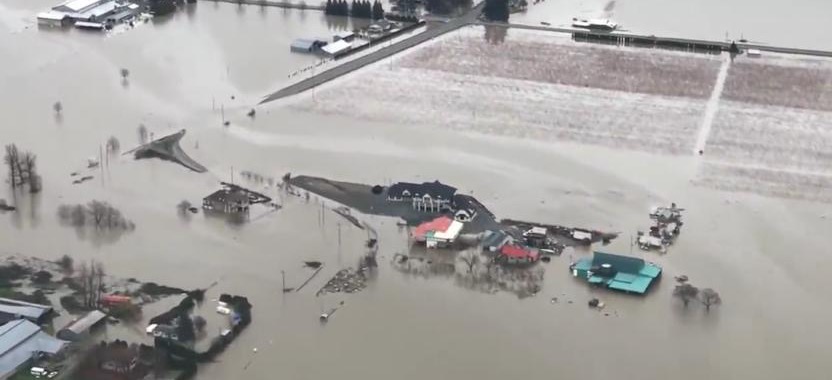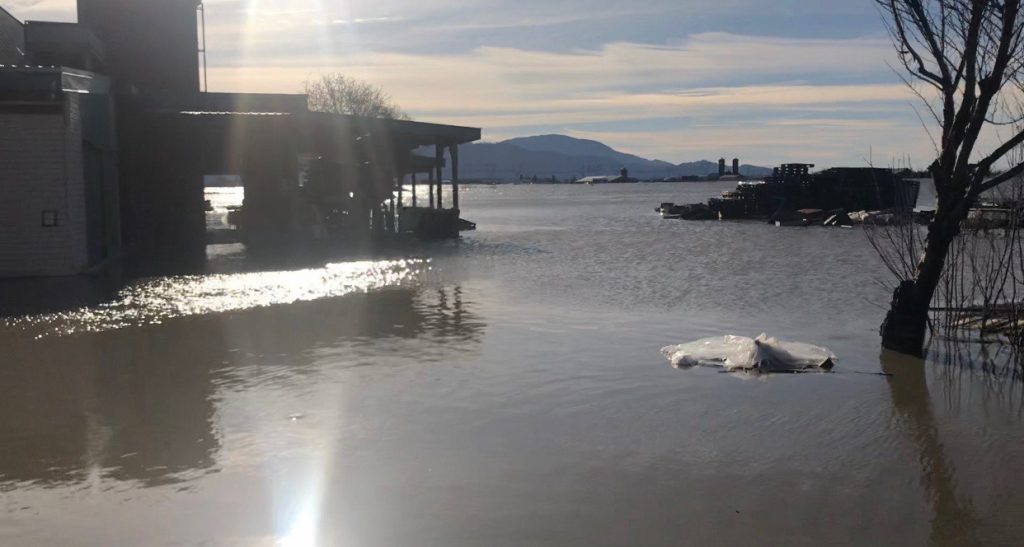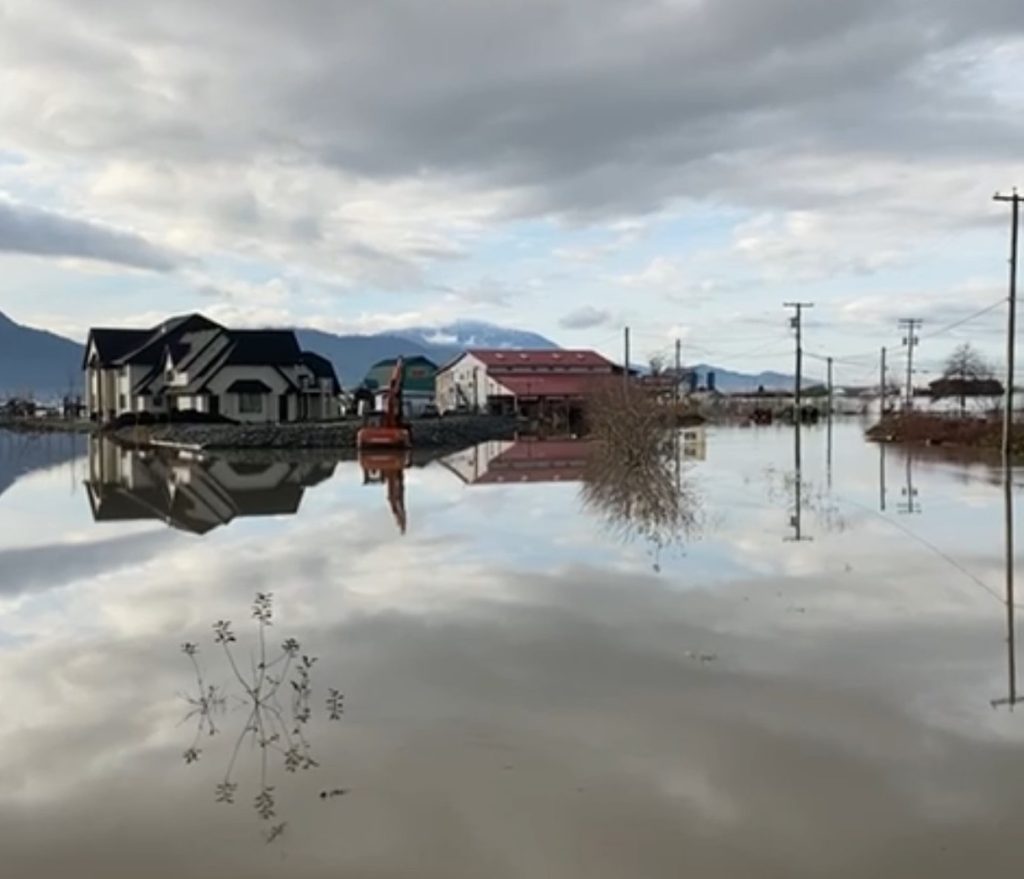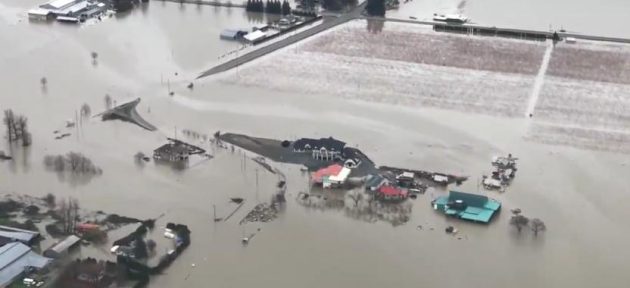UFV horticulture student experiences both loss and hope in the aftermath of flood

Gagan Khakh traveled by tractor the first time he returned to his family’s farm on the Sumas Prairie after being evacuated 48 hours earlier. A truck wouldn’t have cut it. Catastrophic flooding had not only forced road closures in all directions, but had also displaced hundreds of farmers and residents in the area.
When Gagan, a third-generation vegetable and berry farmer and horticulture student at UFV, pulled up to the farm, the sight was both surreal and heartbreaking: Coolers, grading and packing lines, and other expensive and essential equipment were submerged in water. Crops like blueberries and brussel sprouts were destroyed.
“That’s the part that hurts us the most, just seeing stuff still in the field and knowing the damaged crops won’t feed one single person,” says Gagan, 20.
“It was devastating because this is what we worked for our whole lives.”
Gagan’s grandfather, a farmer, immigrated to Canada from India in the 1970s. After working for other farmers in Abbotsford and Port Alberni in his early years in BC, he returned to the Fraser Valley and started his own farm, which eventually became KBF Enterprises on Number 3 Road in Abbotsford.
Now in its fifth decade, Gagan’s parents, relatives and two sisters help run the 500-acre farm, selling a plethora of fruits and vegetables to grocery stores, as well as at several roadside markets. Gagan has worked on the farm since he was 10 years old and has been taking horticulture classes at UFV since 2019 to stay current with best industry practices.

“I’ve gained a lot of knowledge, just stuff that I can use on our own farm for the future, such as sustainability practices,” Gagan says. “It’s good to learn ways to improve the farm and become more efficient just to ensure that the future generations are able to farm the same land that we are.”
But looking too far in the future has been an impossible task for the past week or so. Just keeping safe, assisting the community of farmers, and salvaging what they can is all Gagan and his family have been focusing on.
After staying with family in Chilliwack for five nights, they are back living on the farm on Abbotsford’s Sumas Prairie. Their home, fortunately, did not sustain damage.
“We made a decision just to come home,” he says. “The water is going down slowly and we’re still continuing to harvest. We can’t just wait for someone to save us. We’ve got to save ourselves.”
Fight or flight

The sound of sirens at 7 am woke Gagan up.
On Tuesday, November 16, after the torrential rain storm that rocked the Southern BC region from Sunday into Monday, a groggy Gagan stepped out of the front door of the residence on his family’s farm to find firefighters along with 17 of the farm’s migrant workers with looks of concern and urgency on their faces.
“The firefighter let us know we had to evacuate,” he says.
With water from the Nooksack River rising and floods starting to consume much of the Sumas Prairie, Gagan, his parents and two sisters quickly went into fight or flight mode, assessing who they could help and what they could save in the limited time they had before fleeing.
“We got all the workers out first and made sure they had a place to go because they’re the priority,” he says, noting that all of the workers were placed in safe housing.
The family then had to figure out how to transport his grandfather, who is currently on dialysis, to his healthcare facility in Abbotsford. Gagan’s father took his grandfather to Chilliwack, where he was eventually airlifted to Abbotsford and is now staying with family. Because the water was rising slowly at the farm, the family had time to evaluate the worst case scenarios.
“Once we got all the essential stuff out of the way, we had a chance to think everything through about what was next in our game plan,” he recalls.
Even after they evacuated on Nov 16, Gagan and family members were back and forth from his uncle’s house, where they were staying, to the farm trying to minimize the damage. They moved anything that was not underwater to higher ground.
“We felt we did as much as we could,” Gagan says. “We didn’t want to wonder later, ‘what if I did something differently?’ But we felt that we made all the right decisions in that moment. And I’m grateful for that.”
Picking up the pieces

If there was a silver lining for the Khakh family’s misfortune it is that they planned accordingly when they built the house on the property a few years ago. Even though they built it to be above the estimated flood zone, water was literally inches away from entering the house. Fortunately, they can live with the almost.
“That was really frightening,” says Gagan. “We had already lost so much that losing the house on top of that would have been disastrous.”
Gagan and family do not know the full extent of the financial damage to their farm yet, but are aware that it will be substantial. They know insurance will likely not cover it, and they are hoping that the government steps in with an agriculture recovery program.
“I’ve heard about some disaster relief funds and stuff like that, but we’ve been just so busy,” Gagan says. “Obviously, in the next month or whatever, we will sit down and figure that stuff out.”
Outside of their own problems, the Khakhs have been involved in helping their community and vice versa. The Khakhs and other farmers have been cleaning debris from a nearby canal and preventing it from further damaging the pump station. Other farmers have lent out their facilities to allow the Khakhs to store produce and equipment.
“All the farmers, you know, we’re all trying to work together and help each other,” he says.
Gagan is aware that he can’t control the elements, but is already envisioning a contingency plan if another horrific storm happens again down the line. He is talking about having a better emergency fund, or raising certain areas in the farm higher.
“Just thinking of things to prevent this from happening again,” he says. “So, we wouldn’t lose as much in the future.”





